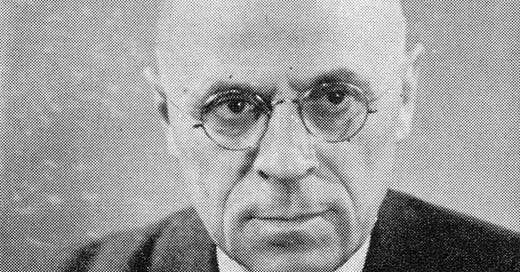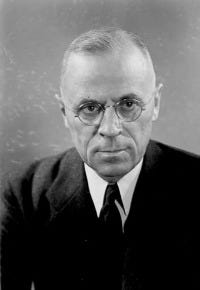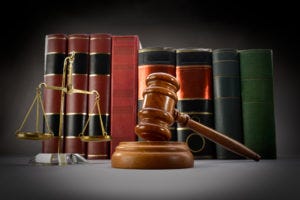The Definition of White Collar Crime
If you search the U. S. criminal code for the definition of white collar crime, you will come up empty. Nor will you find a separate section in the statute books captioned "White Collar Crimes." Nevertheless, the idea of white collar as a distinct category of crime is firmly ensconced not only in the criminal law and law practice but also in popular culture. White collar crime also is a primary focus of this blog. So what exactly is it?
Origin of the Term White Collar Crime
The term "white collar crime" has an interesting history that actually originated in sociology, not law. Sociologist Edwin Sutherland coined the term in the 1930s and defined it as:
Wrongdoing committed by a person of respectability and high social status in the course of his [or her] occupation.
Sutherland thought white collar crime was a serious matter
Sutherland was responding to sociological theories that the root causes of crime were poverty and desperation. He pointed out there was an entire category of crime, which he called white collar crime, committed by people with wealth and high social status. Theories that argued crime was primarily a problem of the lower social classes -- the "blue collar criminals" -- could not explain this type of criminal activity.
Although Sutherland's definition was useful for his sociological purposes, it is not particularly useful for criminal law. The justice system does not define offenses based on the class of the offender. A poor man who commits Medicaid fraud to get the medication he needs to survive and the doctor who commits Medicaid fraud in order to afford a new BMW both commit the same criminal offense. To be sure, prosecutors will handle the cases differently when deciding whether and how to prosecute. But the nature and elements of the offense are the same.
Accordingly, one of the first things I tell students in my white collar crime class is that the term "white collar crime" is something of a misnomer. As Sutherland intended, the term suggests a focus on the nature of the offender - the "white collar" executive or person of high social status. White collar criminal law, however, focuses on the nature of the offense. It refers to a category of criminal offenses that share certain common characteristics.
The Definition of White Collar Crime
As I mentioned, there is no official definition of white collar crime in the criminal code. Here is a good working definition:
White collar crimes are non-violent illegal activities that principally use deceit, deception, concealment, fraud, or misrepresentation to obtain money, property, or some other advantage, or to conceal or cover up other wrongdoing.
This definition excludes a broad category of offenses considered violent crime and "street" crime (assaults, robbery, burglary, etc.). It does not include drug offenses. It also excludes certain specialized criminal areas such as immigration or terrorism.
White collar crimes often present issues and challenges that are quite different from those presented by violent crimes or drug crimes. They may require different resources, a different kind of focus, and a different skill set on the part of both attorneys and investigators. It therefore makes sense not only to study those crimes together but to identify the practice of white collar crime as a distinct specialty.
Examples of White Collar Crimes
Although there is no definitive or exhaustive list, these are some of the leading white collar criminal offenses:
Mail and Wire Fraud
Securities Fraud/Insider Trading
Conspiracy
Bribery, Gratuities, and other public corruption
Obstruction of Justice
Perjury
False Statements
Money Laundering
Racketeer Influenced and Corrupt Organizations Act (RICO)
Foreign Corrupt Practices Act (FCPA)
Characteristics of White Collar Crimes
White collar crimes and generally share some common characteristics, including:
They are non-violent.
Deceit or deception is involved.
Intent is often the central question.
The grand jury plays a critical role.
Defense counsel are actively involved in the investigative stage.
They often involve multiple actors.
They often involve corporations.
Parallel proceedings are often a factor.
They highlight the breadth of the statutes and importance of prosecutorial discretion.
These are generalizations and not all will apply in all cases, but they are the characteristics common to many white collar matters. These characteristics give rise to the special challenges and demands that make white collar crime a distinct practice area for both prosecutors and the defense bar. Let's examine them in more detail.
Non-violent
As the definition quoted above provides, white collar crimes are non-violent offenses. This is a key characteristic that distinguishes white collar crime from many other types of crime.
Deceit or Deception Involved
Again as provided in the definition, the key to most white collar offenses is obtaining money, property, or some other advantage through deceit or deception. It's taking property at the point of a pen rather than the point of a gun. This is what's at the heart of fraud, a concept that is central to many white collar crimes.
Centrality of Questions of Intent
Although bad intent must be proven in all criminal cases, in non-white collar cases it is not usually the central or most difficult question. If a burglar breaks into a home and steals jewelry, his intent in doing so is pretty clear. In a major drug deal, the intent of the parties is not really in dispute. If I stick a gun in your face and take your wallet, my intent is plain. In such cases, it is usually clear that a crime has been committed and that the criminal had the requisite intent. The challenge is finding out who did it and proving that beyond a reasonable doubt.
In white collar cases, by contrast, what happened and who did it are often quite clear. In a contracting fraud case, for example, there will be a paper trail of documents, e-mails, and other records that spell out just what happened and who did what. The central issue will be intent: what was in the minds of the actors at the time. Were the false invoices really an attempt to defraud, or were they -- as the defense will almost certainly claim -- merely an accounting error or some other kind of mistake? Were the gifts to a politician just presents from an old friend, or were they a corrupt attempt to influence the politician's actions? Are the witness's misstatements under oath deliberate lies and therefore perjury, or merely innocent mistakes or misrecollections?
A street crime prosecution typically involves proving observable events that took place -- the shooting, the robbery, the drug deal. A white collar crime prosecution frequently involves proving what was going on in someone's head. Given our inability to read minds, that can make proving such cases beyond a reasonable doubt particularly challenging.
Role of the Grand Jury
In a street crime case, much of the investigative work, such as gathering physical evidence and interviewing witnesses, can be done by case agents outside of the grand jury. In the federal system a drug felony or violent felony will still require a grand jury indictment, but frequently the grand jury work is not extensive. It's clear that a crime has been committed, and once investigators have determined the identity of the suspect the grand jury will simply hear sufficient evidence to find probable cause and vote on the appropriate charges.
In white collar crime, the grand jury plays a much more critical role. The grand jury is the most powerful and important investigative tool of the white collar prosecutor. Grand jury subpoenas allow the prosecution to gather the documents from reluctant businesses and compel sworn testimony from recalcitrant witnesses. The grand jury investigation may extend for months or even years, as complex fraud schemes that may involve millions of documents and scores of witnesses are investigated. Through it all, the grand jury frequently is determining not simpler questions such as "who did it," but questions of intent and whether a crime was even committed at all. Grand jury work is a big part of the practice of white collar crime, for both the prosecution and the defense.
Role of Defense Counsel
In a typical street crime case, defense counsel first gets involved when the client has been arrested, charged, and brought into court for a presentment or arraignment. The investigation usually is largely over, and the case will move forward to trial, plea, or some other disposition.
White collar defense counsel play an entirely different role, one that is related to the central role of the grand jury. For white collar defense counsel, their involvement begins when the first grand jury subpoenas start to fly. They conduct their own investigation, interviewing many of the same witnesses and reviewing many of the same documents being reviewed by the grand jury. Defense counsel coordinate the client's response to the grand jury subpoenas and other investigative steps by the government. They also interact with the agents and prosecutors throughout the investigation to achieve the best possible outcome for their client, whether that means no charges at all, an immunity deal, a plea agreement, or some other disposition.
For a street crime defense lawyer, the case usually begins with the indictment. But for a white collar defense lawyer, job one is managing the investigation and trying to prevent the indictment from ever happening. The white collar case is generally won or lost at the grand jury stage, because if there is an indictment, the odds are overwhelming that the client will either plead guilty or be convicted at trial. This aspect of managing the investigation, and counseling the client throughout, is the distinctive feature of white collar criminal defense work that differentiates it from other criminal defense.
Involvement of Multiple Actors
It's hard to pull off a fraud like Enron or Worldcom by yourself. Significant white collar crimes frequently will involve multiple individuals acting together. This leads to issues involving not only conspiracy law but also the use and representation of cooperating witnesses, negotiating plea bargains that involve cooperation with the "little fish" in order to get the "big fish," seeking and granting immunity for witnesses, joint defense agreements, and other legal issues that arise only in complicated, multi-player investigations.
Involvement of Corporations
Urban legend has it that depression-era bank robber Willie Sutton, when finally apprehended, was asked why he only robbed banks and replied, "Because that's where the money is." Similarly, in our economy, corporations are the vehicle through which large amounts of capital are raised. Because white collar crimes frequently are business crimes or "money crimes," corporations often end up involved in the case, either as potential defendants or as victims.
A related aspect of this is the possibility of corporate criminal liability, with corporations actually being charged with the crimes committed on their behalf by their agents - something that rarely occurs in the world of street crime or drug cases. For defense counsel this also raises unique challenges involving representing corporate entities vs. representing individual defendants.
Parallel Proceedings
White collar cases often involve events that generate interest from multiple different agencies or investigative bodies. For example, in a major bank fraud case, the same set of facts may be the subject of investigations by the federal grand jury, state grand juries, and federal agencies such as the IRS or the SEC. There may be multiple civil suits filed by aggrieved parties. Congress may want to hold hearings and have witnesses testify. Trying to manage all of these different proceedings simultaneously presents special challenges for white collar defense counsel in particular, but also for the prosecution. Once again, in the criminal world of drug crimes or violent crimes, this is not often an issue.
Breadth of Statutes and Importance of Prosecutorial Discretion
White collar crime statutes are notoriously broad and, in many cases, somewhat vague. Many statutes prohibit "fraud," for example, but nowhere is fraud defined. The statutes speak in broad proscriptions, perhaps necessarily so to avoid loopholes and evasion by clever criminals. This heightens the role and importance of prosecutorial discretion.
In a homicide case, if the prosecutor believes she can prove who did it, she is going to prosecute. She will not take a pass in favor of a civil suit by the victim's family. In a potential fraud case, though, there may be many possible alternative outcomes and remedies. The white collar prosecutor may look at a potential complex fraud case and decide the conduct is not clearly criminal enough to justify the time and resources of a criminal investigation. She may decide the matter can be resolved through civil sanctions by the SEC or through some other remedy.
White collar offenses themselves are often less black and white. Accordingly, the role of the prosecutor in interpreting the statutes and determining when charges are appropriate is much greater. Whether prosecutors do a good job of exercising this discretion in all cases is currently a subject of considerable debate.





